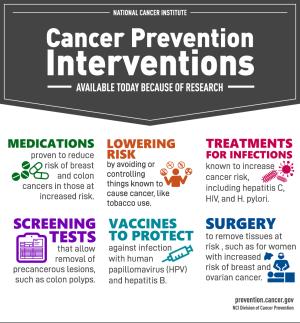Date Posted, by DCP Staff
Cancer Prevention Science editors spoke with Deborah Winn, Ph.D., acting director of the NCI Division of Cancer Prevention, about cancer prevention and early detection research in the division and beyond.
On This Page
- All Heading 2s will automatically be pulled in to this list.
- Do not edit the content on this template.
Why is cancer prevention research important?
One important way to make sustained progress against cancer deaths is to prevent people from developing cancer in the first place. In 2019, there will be about 1.76 million people diagnosed with cancer in the United States. By 2025, the estimate is that there will be 2.1 million people who get cancer. Some of this is due to the aging of the U.S. population, but there is a public health imperative to do what we can to decrease those numbers by using existing and emerging knowledge of ways to reduce cancer risk, which could result in many more lives saved.

What are some good interventions to prevent cancer right now?
There have been some big wins in cancer prevention science. For example, we know that tobacco control efforts help reduce the cancer burden. HPV vaccines are protecting against several kinds of cancer. Screening with colonoscopies can find precancerous growths and have them removed. But even those known successes don’t always reach the people who need it. Also, many of these interventions are geared to overall health, such as getting exercise and avoiding obesity, which can benefit people by reducing risk for many diseases, not just to cancer.
What kind of interventions are prevention researchers looking to find or create next?
The general principle of intervention for cancer prevention is that we are focusing on a population that does not yet have cancer. Anything we do for a healthy person needs to be super safe and effective, because they are healthy people and because almost all interventions have some risk. We need to understand who is at high risk of a specific kind of cancer, so the benefit of an intervention outweighs any potential for side effects. Research is looking at ways to better identify cancer risk, to map the molecular and genetic pathways that lead to cancer. Then we need to interrupt the path to prevent the disease without harming the person at risk.
What areas of prevention research does the Division of Cancer Prevention conduct and support?
As an extramural division, DCP supports and promotes investigators across the country and internationally in critical research to grow our understanding of the cancer process and to develop effective measures to interrupt that process. These interventions can include drugs, vaccines, surgery, or behavioral modifications that interrupt the molecular and biological pathways that are involved in cancer risk and development. Potential biomarkers of early detection and new screening technologies are other approaches we can use.
How has the Cancer MoonshotSM affected cancer prevention science?

Deborah Winn, Ph.D., acting director of the NCI Division of Cancer Prevention
Several of the research initiatives from the Cancer Moonshot involve cancer prevention and detection science. Immune-based approaches for the prevention of cancer in adults, the prevention and early detection of hereditary cancers, and the precancer atlas portion of the Human Tumor Atlases are three of the major projects that DCP participates in. Future posts in this blog will cover some of those projects.
What is the goal of the NCI’s Board of Scientific Advisors Ad Hoc Working Group on Prevention?
Cancer prevention writ broadly is the focus. The best answer I can give you is the statement of the board itself, who are a group of experts from across the U.S. who will advise NCI on strategic directions:
“Given the changing nature and opportunities related to cancer prevention, screening, and early detection, the NCI Board of Scientific Advisors (BSA) will convene a Working Group to consider how best to utilize the significant, albeit limited, resources and personnel of NCI in developing and sustaining a cancer prevention and early detection research program. Working Group membership will include select BSA and NCAB members, as well as individuals with expertise in prevention, early detection, risk assessment, data science, technology, clinical informatics, consumer health, basic research, translational research, and other domains. The Working Group will advise the NCI Board of Scientific Advisors and the NCI Director.”
Why read the Cancer Prevention Science blog?
Prevention science, like all science, happens in small steps. Not every publication is worthy of a press release, but each step can be informative. Even perceived failures can open up possibilities. Over the course of this blog we will introduce you to the new projects and steps we are taking that we hope will one day have a big impact.
If you would like to reproduce some or all of this content, see Reuse of NCI Information for guidance about copyright and permissions. Please credit the National Cancer Institute as the source and link directly to the blog post using the original title, for example: "Cancer Prevention Science is Key to Making Progress Against Cancer was originally published by the National Cancer Institute." For questions, contact us at CancerPreventionBlog@mail.nih.gov.
